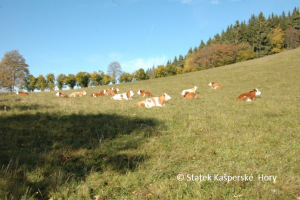An example of a large-scale previously state owned farm, which now successfully combines economic sustainability and the provision of public goods.

The Farm Kašperské Hory is located in the Šumava natural park (also known as “The Bohemian Forest”) in the Czech Republic. The farm was founded in 1996 after the break-down of the large-scale socialist State Farm. The farm gradually reduced its farming intensity and in the late 1990s entered the organic scheme.
Since then, the farm has focussed on high-nature-value farming in mountain areas and extensive cattle production. It currently manages 875 hectares of perennial grassland and specializes in the breeding of quality Simmental cattle. One of the unique features of the farm is that it is 100% owned by the municipality of Kašperské Hory.
The farm provides stewardship of the landscape with nearly 900 hectares of meadows and pastures, as well as securing 14 jobs for local people.
The farm uses a sustainable beef cattle production model, demonstrating how to achieve a good balance between productive agriculture and landscape maintenance.
The organic farming measure (M11) enabled the farm to create a highly resilient system that can better adapt to the negative impacts of climatic change.